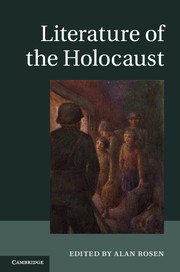Book contents
- Frontmatter
- Contents
- Notes on contributors
- Acknowledgments
- Introduction
- Part I Wartime victim writing
- Part II Postwar responses
- Chapter 3 The Holocaust and Italian literature
- Chapter 4 German literature and the Holocaust
- Chapter 5 Hebrew literature of the Holocaust
- Chapter 6 The Holocaust and postwar Yiddish literature
- Chapter 7 The Holocaust in Russian literature
- Chapter 8 The Holocaust in English-language literatures
- Chapter 9 Polish literature on the Holocaust
- Chapter 10 Hungarian Holocaust literature
- Chapter 11 French literature and the Holocaust
- Part III Other approaches
- Guide to further reading
- Index
- References
Chapter 7 - The Holocaust in Russian literature
Published online by Cambridge University Press: 05 June 2014
- Frontmatter
- Contents
- Notes on contributors
- Acknowledgments
- Introduction
- Part I Wartime victim writing
- Part II Postwar responses
- Chapter 3 The Holocaust and Italian literature
- Chapter 4 German literature and the Holocaust
- Chapter 5 Hebrew literature of the Holocaust
- Chapter 6 The Holocaust and postwar Yiddish literature
- Chapter 7 The Holocaust in Russian literature
- Chapter 8 The Holocaust in English-language literatures
- Chapter 9 Polish literature on the Holocaust
- Chapter 10 Hungarian Holocaust literature
- Chapter 11 French literature and the Holocaust
- Part III Other approaches
- Guide to further reading
- Index
- References
Summary
The Soviet Jewish mortality toll during World War II was over 2 million, including over 200,000 soldiers killed at the front. Yet the total number of Soviet citizens who perished during the war was over 20 million. This proportion made it possible for Soviet literature to downplay the specificity of the Holocaust, representing the slaughter of the Jews mainly in terms of the Nazi murder of civilian populations in occupied areas. The subject of the Holocaust was taboo for long stretches of Soviet history; the transliterated word itself came into use only after perestroika.
In fact, the Soviet blocking of information about the Nazi persecution of the Jews following the Molotov–Ribbentrop Pact of August 1939 was one of the reasons for the insufficiently strenuous efforts of Jewish civilians to evacuate eastwards during the first days of the war. As if by inertia, news of the massacres of Jews on the Soviet territories in late summer of 1941 likewise received little or no media coverage.
- Type
- Chapter
- Information
- Literature of the Holocaust , pp. 118 - 130Publisher: Cambridge University PressPrint publication year: 2013
References
- 2
- Cited by



